Outsourcing to Eastern Europe

In an increasingly digital and globalized world, outsourcing has emerged as a critical strategy to optimize business processes, drive innovation, and cut costs. The outsourcing market has evolved significantly, with Eastern Europe rising as a great IT service hub for hiring dedicated teams. According to Statista, the market value of IT outsourcing to Eastern Europe is expected to grow by 9% annually from 2023 to 2027, reaching $5.94 billion by 2027.
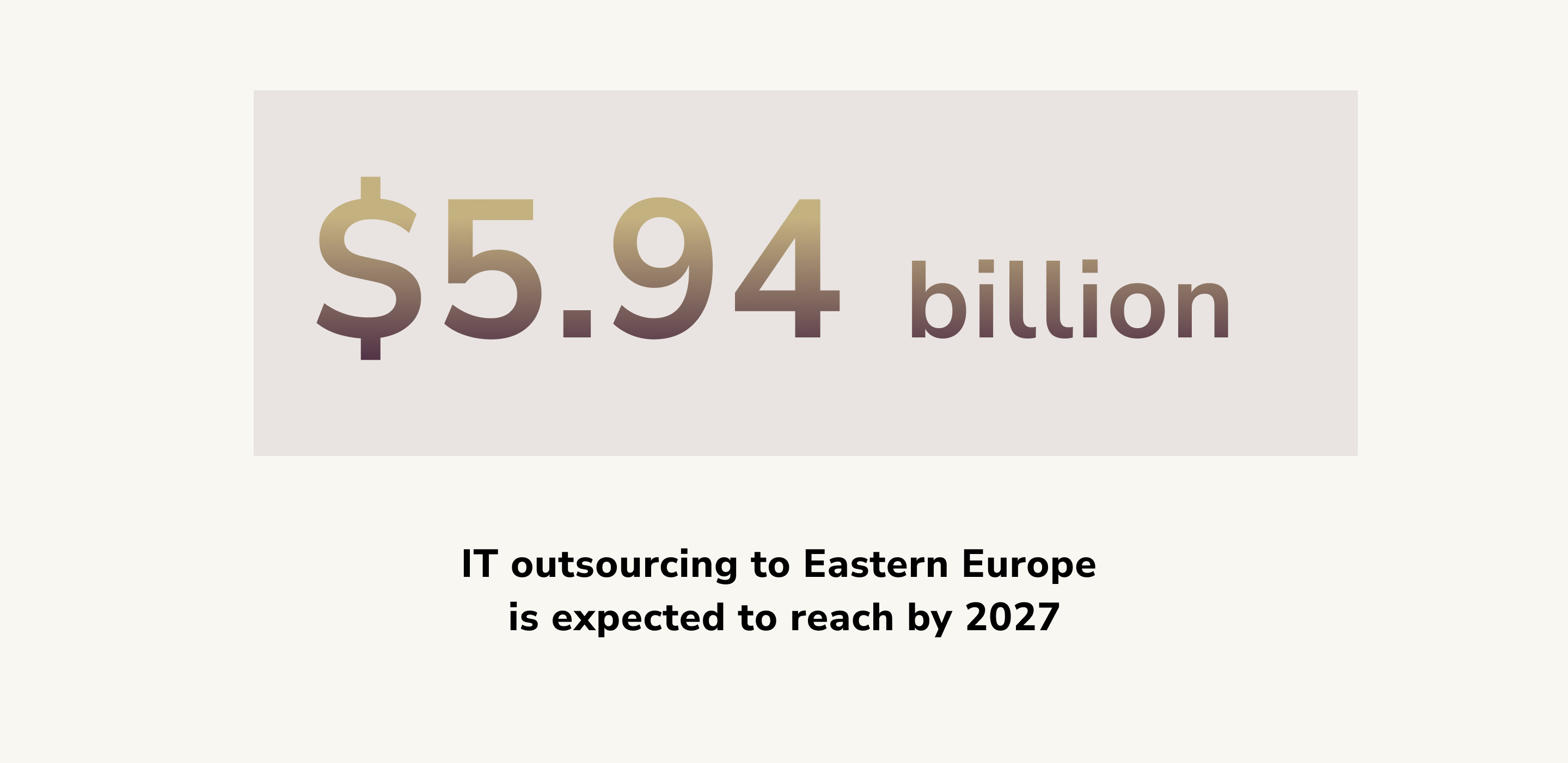
This article will explore why outsourcing to Eastern Europe is attractive for businesses worldwide, mainly for CEOs, CTOs, Development Team Leads, and startup owners looking to capitalize on global opportunities. Whether you are considering outsourcing for custom product development, mobile app development, product feature enhancement etc., this comprehensive guide will provide valuable insights into the burgeoning IT landscape in Eastern Europe and its growing market value.
Outsourcing to Eastern Europe: Brief Overview
Thanks to its rich reservoir of IT professionals, Eastern Europe is a formidable contender in the global IT landscape. Countries like Ukraine, with over 300,000 IT professionals, Poland, boasting over 525,000, and Romania, with around 150,000 ICT professionals, contribute significantly to the region's large and ever-expanding talent pool. This, combined with the robust emphasis on STEM education, makes Eastern Europe a popular outsourcing destination. Poland, for instance, holds the 4th rank in Europe for the number of students graduating in Information and Communication Technologies as per Eurostat.
The region's cost-effectiveness also adds to its appeal as an outsourcing hub. Notably, Eastern Europe presents competitive costs in comparison to Western Europe. Consider the average hourly rate of a software developer in the region, which typically ranges from $20 to $40. This rate starkly contrasts the hourly average rates in Western Europe, which can fluctuate between $50 to $100 ( $35-60 for Ukrainian developers ), contingent upon the specific country and expertise level.
Eastern Europe is culturally and geographically close to major business centers. Most countries within the region operate in the Central European Time Zone (CET), just an hour ahead of Greenwich Mean Time (GMT). This synchronization significantly overlaps with business hours in Western Europe and the U.S., facilitating real-time communication and collaboration.
Rounding off the region's assets is its favorable business environment. Several Eastern European countries are either part of the European Union (EU) or associated with it, lending a measure of reliability and security to business partnerships. The IT sector forms a crucial part of these countries' economies.
A case in point is Ukraine, where IT services constitute around 4% of the nation's GDP. Consequently, Eastern Europe offers an appealing blend of talent, cost-effectiveness, and favorable business conditions, increasingly attracting outsourcing operations.
Finally, because of the ongoing russia-Ukraine war, there is a major business outflow from russia and Belarus. Clients seek new vendors, which is why outsourcing to Eastern Europe gains even more traction and becomes even more favorable in the eyes of many companies.
Comparison to Western Europe
While Western Europe has a strong IT sector and high-quality services, Eastern Europe presents a compelling alternative for businesses seeking to outsource for the following reasons:
- Lower Costs. Eastern Europe offers high-quality services at a fraction of the price of Western Europe. A business could save up to 50% on development costs by outsourcing to Eastern Europe.
- High Skill Levels. Despite the lower cost, the quality of IT services in Eastern Europe is maintained. For instance, according to the TopCoder ranking, countries like Poland, Ukraine, and Hungary rank highly in coding quality.
- Cultural Similarities and Proximity. Eastern Europe's proximity to Western Europe and cultural similarities make for smoother business interactions and understanding. Many professionals in Eastern Europe also have a high level of English proficiency, further facilitating communication.
- Favorable Time Zones. Unlike outsourcing destinations in Asia, Eastern Europe's time zone aligns more closely with Western Europe's. This alignment can make scheduling meetings and maintaining regular communication easier.
Overall, both Eastern and Western Europe are rich tech hubs and popular destinations for outsourcing. However, if you need cost-effectiveness, Eastern Europe is the location to approach.
Why Outsourcing to Eastern Europe?
Outsourcing to Eastern Europe has become a popular choice for companies worldwide. Here's a breakdown of the factors you listed:
Broad Talent Pool
Outsourcing to Eastern Europe grants access to a considerable pool of professionals with technical expertise, especially in IT and software development. For instance, countries like Ukraine, Poland, and Romania have tens of thousands of IT graduates yearly. These professionals often have advanced proficiency in a variety of languages and platforms. For example, Ukraine, which has over 300,000 IT professionals, is known for having one of the world's largest populations of JavaScript and Python developers.
Need help with choosing the right professionals for your startup? Read our guide on hiring software engineers and build your team with confidence!
High-Quality Education and Cultural Fit
Eastern European developers are renowned for their rigorous education in mathematics, science, and engineering. Belarus, for example, is famous for its STEM-focused education system. This results in a workforce highly skilled in problem-solving and logical thinking. Regarding cultural fit, Eastern Europeans' work ethic, pragmatism, and direct communication style often align well with Western business cultures. For instance, Poles are often valued for their reliability and high-quality work, while Romanians are appreciated for their language skills and adaptability.
Business Climate
Many Eastern European countries are becoming increasingly friendly to foreign businesses, making outsourcing to Eastern Europe smooth. For instance, Estonia is known for its advanced digital society, which includes e-Residency, a digital identity available to global entrepreneurs. This system allows international businesses to manage their Estonian company entirely online. Countries like Poland and Hungary are part of the European Union, offering stability, transparency, and easy access to the EU market.
Cost-Effectiveness
The cost of living in Eastern Europe is generally lower than in Western countries, which translates into lower salaries for equally qualified professionals. For example, a software developer in Romania or Bulgaria might cost significantly less than their counterpart in Germany or the UK without compromising the quality of work. This cost-effectiveness can significantly save companies, especially those with large-scale projects.
Geographic Location and Time Zones
Eastern Europe's geographic location makes collaborating convenient for Western businesses. For example, there's a minimal time difference between Eastern Europe and Western Europe, facilitating real-time collaboration. In the case of North America, companies can benefit from a "follow the sun" approach where Eastern European teams continue working on projects while their American counterparts are off-duty. Moreover, the relative proximity allows for more accessible travel arrangements. For instance, it's a short flight from major European business hubs like London or Berlin to cities like Kyiv, Warsaw, or Bucharest.
Strong Tech Infrastructure
Many Eastern European countries have prioritized building robust technological infrastructures. These countries understand the necessity of high-speed, reliable internet connections and modern facilities to compete in today's digital economy. For instance, Romania is known for having some of the fastest internet speeds in the world, which aids in seamless collaboration and communication. Outsourcing to Eastern Europe allows you to leverage this infrastructure for efficient operations.
Innovation and Creativity
Eastern Europe is increasingly known for its creative problem-solving and innovative technology solutions. Startup ecosystems in cities like Tallinn, Estonia, and Sofia, Bulgaria, are vibrant and continue growing, often producing novel solutions in fintech, AI, and digital services. By outsourcing to Eastern Europe, you're hiring workers and potentially tapping into a vibrant network of innovative thinkers and problem solvers.
Growing Markets
Eastern Europe includes some of the fastest-growing economies worldwide, with increasing consumer demand in various sectors. By outsourcing to Eastern Europe, businesses might find additional opportunities to expand their products or services into these markets. For instance, the e-commerce market in Poland has seen rapid growth in recent years, presenting an attractive market for businesses operating in this sector.
Language Skills
Eastern European professionals often excel in foreign language skills, particularly in English, German, French, and other European languages. English proficiency among younger professionals is exceptionally high in countries like the Czech Republic and Slovakia. These language skills can facilitate smooth communication and collaboration with your outsourced team.
Data Protection and Privacy
As part of the European Union, many Eastern European countries must comply with the General Data Protection Regulation (GDPR), ensuring high data privacy and security. This adherence provides reassurance for companies dealing with data processing agreements. For example, a German company outsourcing to Bulgaria can be assured that the Bulgarian company is subject to the same stringent data protection laws as Germany.
While these factors make Eastern Europe an attractive outsourcing destination, choosing a partner that aligns with your company's values, communication style, and business objectives is crucial. Always do thorough research and consider all options before making a decision.
Challenges of Outsourcing to Eastern Europe?
Recognizing the potential challenges when considering outsourcing to Eastern Europe is crucial. Here is an expanded description of each point:
Possible Taxation and Legal Challenges
Every country has unique laws and regulations regarding business operations and taxation. When outsourcing to Eastern Europe, you must understand and adhere to local tax laws and regulations. There may be differences in accounting standards, contract law, and dispute resolution processes. For example, dealing with VAT refunds might be complex, and some countries may have strict regulations about data privacy or labor law, which could impact your operations.
Less Project Control
Outsourcing inherently means giving up some control over the outsourced function or project. Working in a different country with a different time zone, language, and culture can sometimes lead to misunderstandings and management difficulties. Additionally, due to the distance, overseeing the daily progress of a project could be challenging, as could ensuring that the outsourced team fully understands and aligns with your company's vision and objectives.
Security Concerns
When you outsource, especially when dealing with sensitive information, you trust the third-party provider to safeguard your data. There could be a risk of data breaches or misuse of confidential information. That is why you need to master service agreements in outsourcing. While many Eastern European countries adhere to EU data protection regulations, which are stringent, this does not eliminate the potential for security issues. Cybersecurity practices of the outsourcing company, employee diligence, and the local legal system's effectiveness in case of disputes or data breaches all factor into this risk.
Remember, conducting thorough due diligence before outsourcing any business operation is crucial. Consider all possible risks and challenges, consult with legal and tax experts, and ensure you have a clear, comprehensive contract and project plan with any outsourcing provider.
Best IT Outsourcing Destinations in Eastern Europe
Poland
Recognized for its extensive tech talent and considerable size, Poland has emerged as a prominent player in Eastern Europe's tech scene. The country has earned a reputation as a dependable outsourcing hub, evidenced by its numerous accolades. Notably, Poland holds the 9th spot in Tholons Top 100 Outsourcing Destinations.
In addition, the 2021 A.T. Kearney Global Services Location Index bestowed Poland the 14th rank as the most attractive outsourcing hotspot, acknowledging its financial allure and a ready supply of tech professionals. The Ease of Doing Business Ranking further underscores Poland's progress by positioning it at number 40, acknowledging the enhanced business startup conditions and contract enforcement within the country.
Overview
- There are over 15,000 IT companies in Poland.
- The number of ICT professionals in Poland is estimated to be around 430,000.
- The leading IT hubs in Poland are Warsaw, Krakow, Wroclaw, and Poznan.
- The IT sector contributes significantly to Poland's GDP, with IT services accounting for approximately 2.5% of the country's GDP.
Stability
Poland has a robust and diversified economy that has seen consistent growth over the past several years. While Poland is part of the European Union, it has not adopted the Euro as its currency. Poland's economy is considered stable and is one of the fastest-growing within the EU. Thus, outsourcing to Poland grants many advantages.
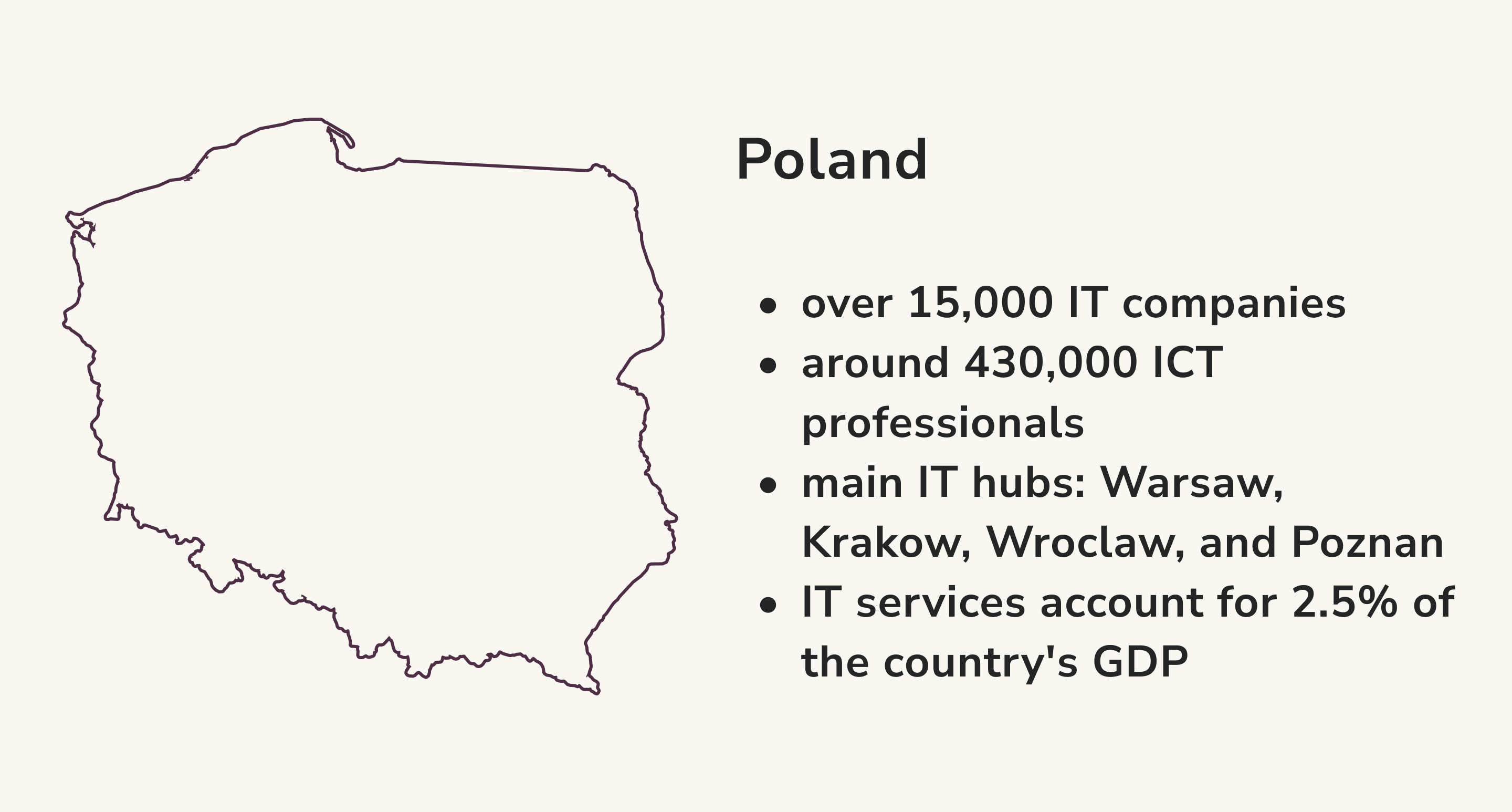
Pros
- Skilled Workforce. Poland is renowned for its education system, particularly in STEM fields, resulting in many highly qualified IT professionals with technical expertise.
- Vital IT Infrastructure. Poland has a robust IT infrastructure and high-speed internet connectivity, supporting seamless remote work and communication.
- Cultural and Geographical Proximity to Western Europe. Poland is in the same or close time zone as many Western European countries and shares similar cultural and business practices.
Cons
- Rising Costs. While Poland offers competitive rates compared to Western Europe, it is becoming a more expensive option within Eastern Europe due to increasing labor costs.
- High Demand for Talent. The increased demand for IT professionals in Poland can make finding and retaining the talent you need more challenging.
Ukraine
Ukraine has consistently been recognized as a leading hub for IT outsourcing. However, this robust growth trajectory faced a severe test with the onset of the full-scale russian invasion. Yet, despite all the turmoil, outsourcing to Ukraine is still a viable and favorable option.
Overview
- A strong IT workforce of 285,000 ICT professionals
- By 2022, over 5,000 IT firms were established in the country, producing an impressive $6.8 billion in export revenues.
- In the four years leading up to this, the export volume had successfully doubled and expanded at a consistent rate of 27% annually.
Stability
It is hard to offer a clear picture of the country’s economic stability during war and turmoil. However, even after 450 days of active battles, Ukraine still stands strong — its banking system operates without hiccups, the government provides tax cuts to save businesses, and foreign investments are still flowing. As a result, outsourcing in Ukraine contributes to the nation’s economic growth, especially regarding software development outsourcing in Ukraine.
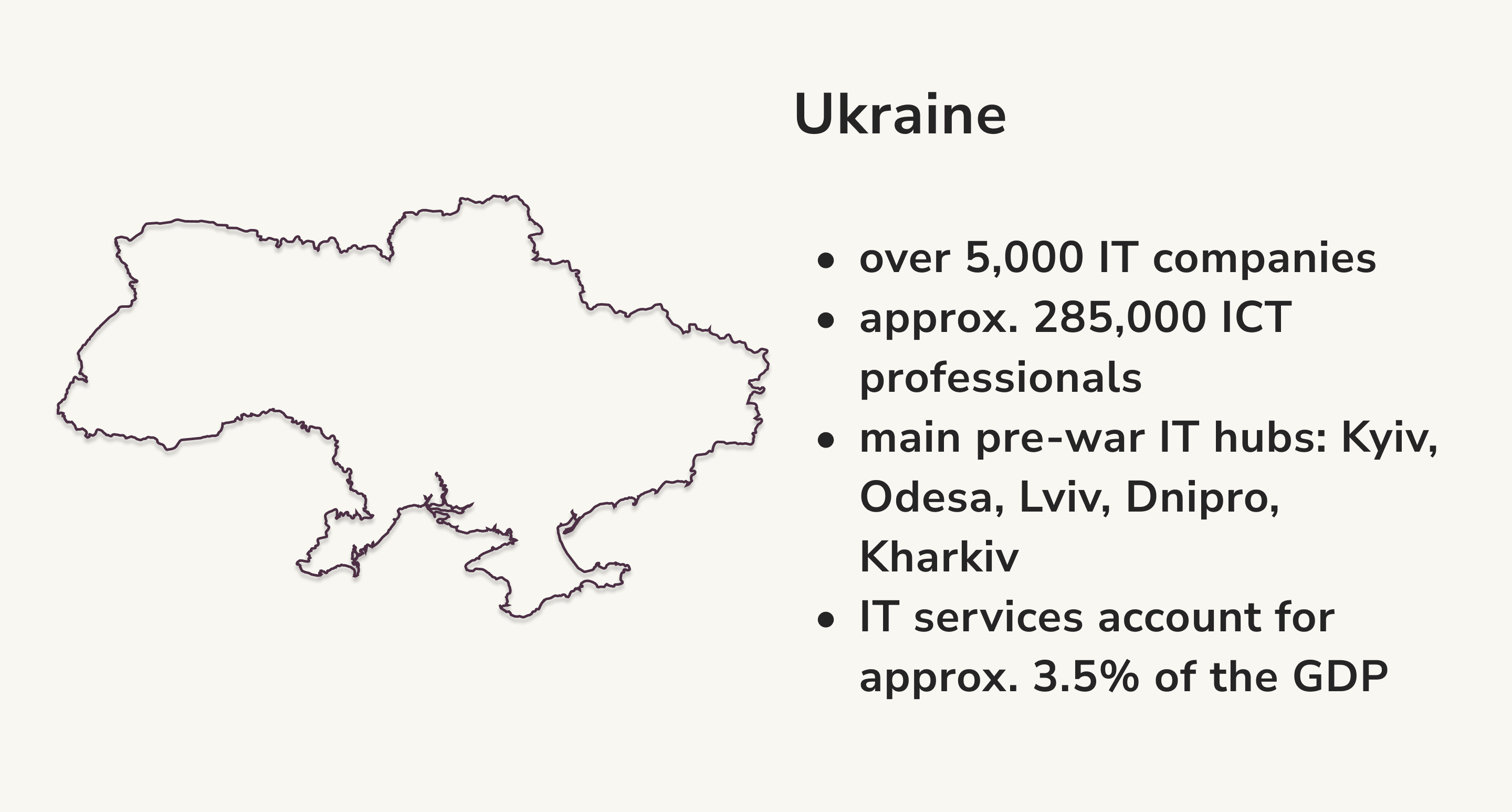
Pros
- Cost-effectiveness. Outsourcing IT projects to Ukraine provides an economical solution without compromising quality. The country is home to competitively priced IT professionals who deliver high-quality services. Compared with US, UK, and German rates, Ukrainian IT services outsourcing is cost-effective, especially those provided by senior developers. The cost-quality balance makes Ukraine an attractive destination for IT outsourcing, outpacing even more affordable markets such as India due to superior code quality.
- Availability of Skilled Professionals. Ukraine boasts up to 13,000 specialists graduating annually from universities. The country is rich in skilled developers proficient in popular programming languages like JavaScript, C#, Java, Python, and PHP. Furthermore, 87% of IT workers in Ukraine have higher education, testifying to the solid educational infrastructure supporting the industry.
- Cultural Similarities and Multilingual Skills. Outsourcing to Ukraine is about technical skills but also about accessible communication and shared cultural values. Most Ukrainian IT professionals have at least an average command of English, and many companies offer language courses to enhance their employees' skills further. Moreover, Ukrainian IT professionals' work ethic and values mirror their Western counterparts, facilitating a smoother and more productive collaboration.
Cons
- Wartime Instability. Undoubtedly, 2022 was a testing year for Ukraine, particularly for businesses. Yet, the IT sector swiftly bounced back post-war and continued to function. As per Forbes Ukraine, IT firms contributed 44% of Ukraine's service exports in 2022, retaining and gaining new customers amid air raids and terrorist threats.
- Time Zone Proximity. Working on IT projects often involves global teams, which can sometimes be inconvenient due to time differences. Fortunately, the minor 1–2 hour difference between Ukraine and Europe doesn't impede workflows or meetings. Collaborating with the USA is a bit more challenging due to a 7–11 hour time difference. However, effective scheduling has successfully exported 40% of Ukraine's IT services to the USA.
Lithuania
Lithuania has a vibrant and rapidly growing IT sector. It has become a significant hub for global tech companies due to its pool of highly skilled ICT professionals, robust infrastructure, and favorable business environment. Outsourcing to Lithuania is a great opportunity to tap into the nation’s IT-centric culture.
Overview
- Over 2,000 IT companies were operating in Lithuania. These companies and the rest of the ICT sector employ over 30,000 professionals. These numbers have likely increased in the subsequent years.
- Vilnius, Lithuania's capital, is the country's primary IT hub. Kaunas, the second-largest city, is also becoming increasingly attractive for IT companies and professionals due to the presence of Kaunas University of Technology, one of the leading technical universities in the Baltic States.
- ICT contributes significantly to Lithuania's GDP, accounting for around 6–7% as of 2021. Moreover, IT export is an essential part of Lithuania's economy.
Stability
Lithuania is part of the European Union and enjoys a stable economic environment. It's one of the fastest-growing economies in the EU, showing significant progress since its integration into the EU in 2004. Lithuania adopted the Euro as its currency in 2015, further strengthening its economic stability.
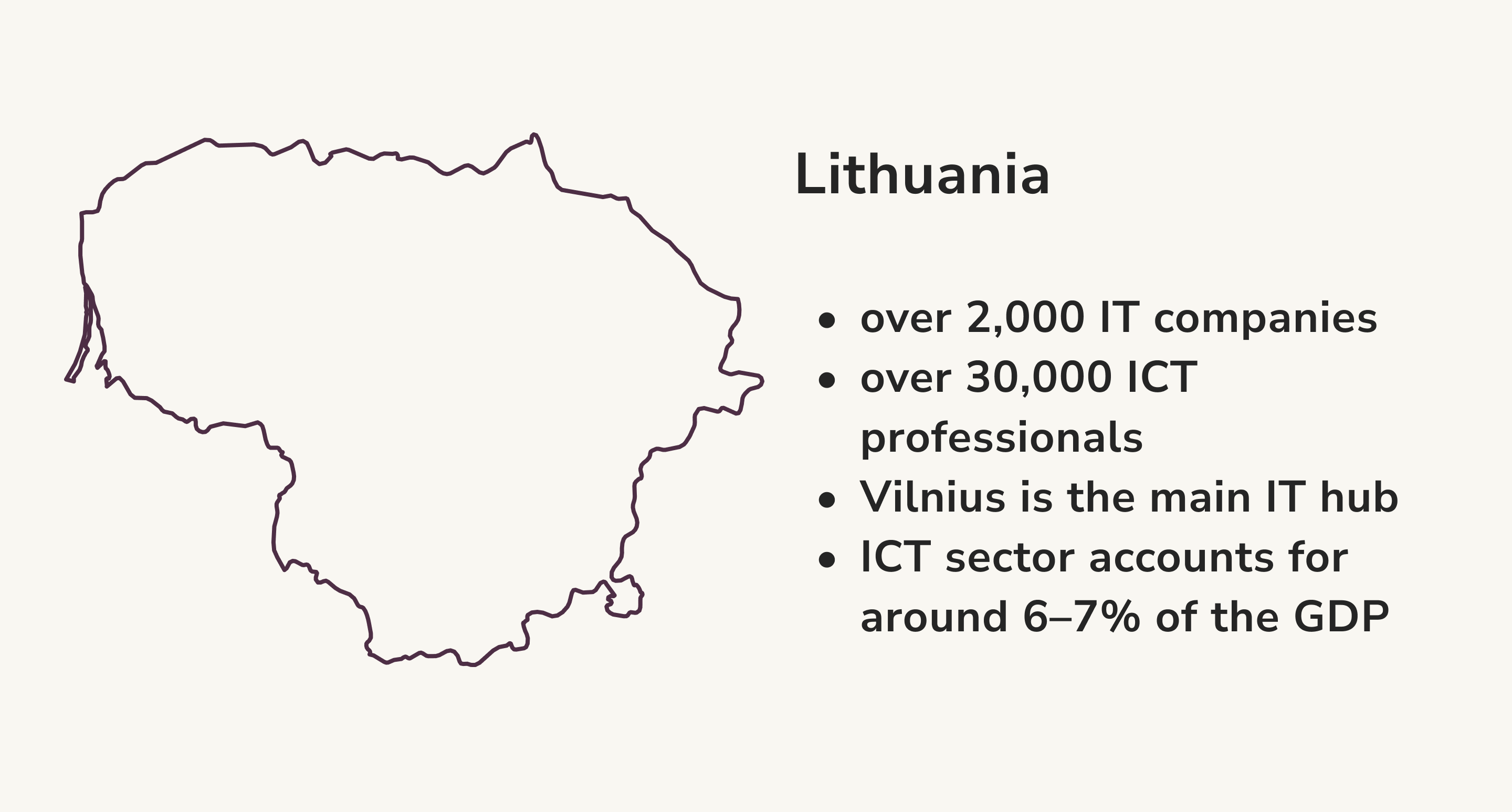
Pros
- Talented Workforce. Lithuania has a high percentage of English-speaking professionals and is renowned for the solid technical education provided by its universities.
- EU Member. Lithuania adheres to EU laws as an EU member state, providing a secure and stable legal environment.
- Technological Infrastructure. Lithuania is recognized for having one of the fastest internet speeds globally, facilitating seamless remote work and communication.
Cons
- Limited Scale. While Lithuania's IT workforce is skilled, the country has a relatively small population. This could limit the scale of operations that can be outsourced there.
- Cost. While Lithuania is more affordable than many Western European countries, its rising prosperity and increasing demand for tech skills might not be as cost-effective as other outsourcing destinations.
Latvia
Latvia's IT sector is on the rise, with a steady increase in IT companies and professionals. The industry is known for its innovation and competitiveness, explicitly focusing on software development, fintech, and IT services. Outsourcing to Latvia provides access to a highly skilled workforce and much more.
Overview
- Approximately 1,500 IT companies in Latvia, but this number has likely grown. The total number of ICT professionals was estimated to be over 20,000.
- Riga, the capital of Latvia, is the central IT hub in the country. It hosts most IT companies and the highest concentration of IT professionals.
- The exact GDP contribution of IT exports is not readily available, but the tech industry, including the ICT sector, contributes significantly to Latvia's economy. As of 2021, the ICT sector's total value added was around 5% of the country's GDP.
Stability
Latvia is part of the European Union and the Eurozone, contributing to its economic stability. The country has a market-oriented economy and has made significant strides in terms of economic growth and stability since joining the EU in 2004.
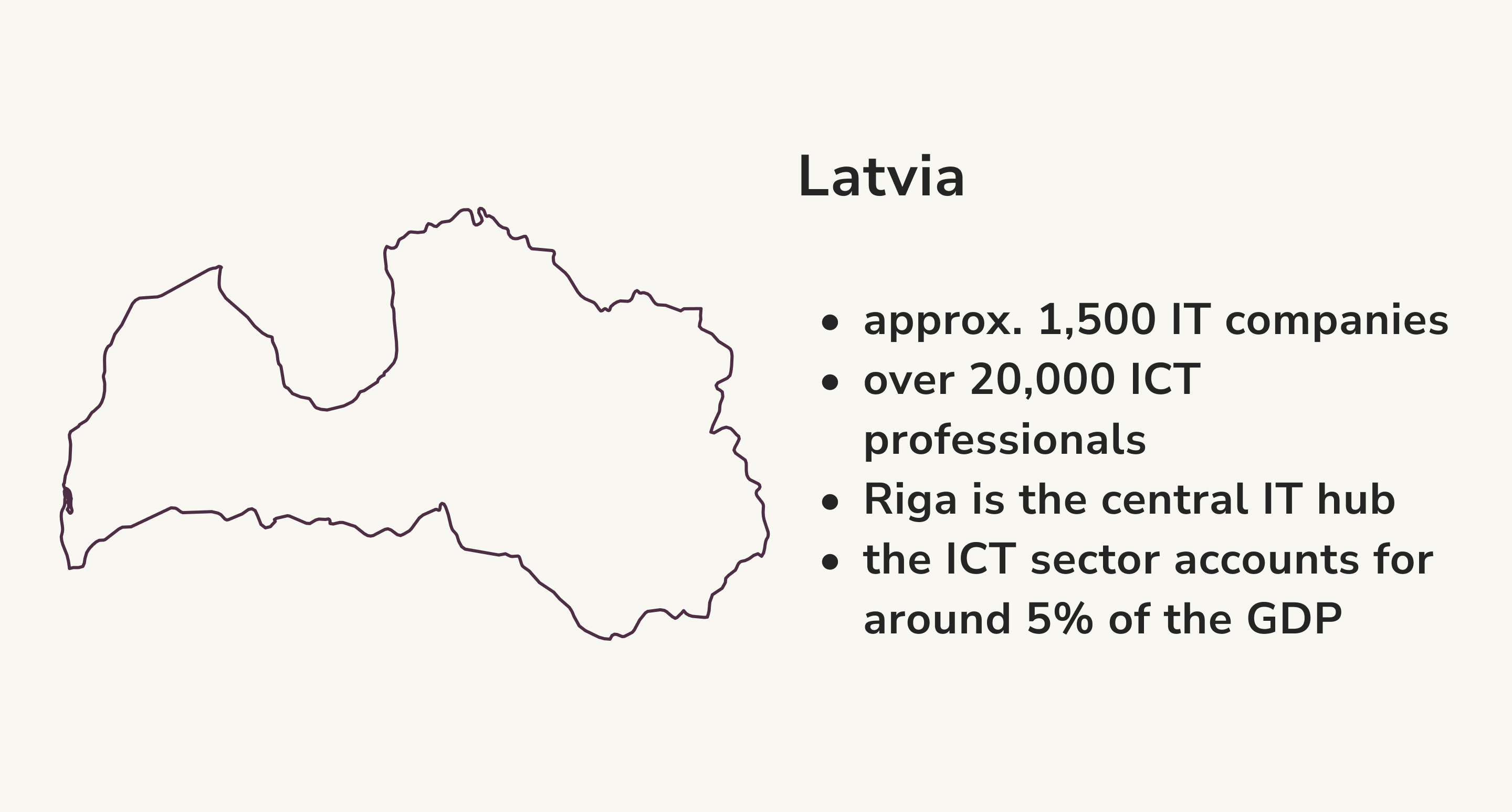
Pros
- Highly Skilled Workforce. Latvia strongly focuses on education, particularly in STEM fields, resulting in a skilled and educated workforce.
- Vital Infrastructure. Latvia has a robust and modern IT infrastructure, with one of the fastest internet speeds in the world.
- EU Membership. Being part of the EU, Latvia provides a secure business environment with strict adherence to EU regulations and standards.
Cons
- Size of the Market. Latvia has a small population, which could limit the scale of IT operations in the country.
- Cost. Although Latvia's fees are lower than in Western European countries, the increasing demand for IT services and professionals could lead to higher prices.
Estonia
Estonia's IT sector is known for its innovation, with Estonia often dubbed "e-Estonia." The country has a digital society with services like online voting, e-residency, digital signatures, and an effective e-governance system. Outsourcing to Estonia is a chance to see what digital transformation can do to the conventional bureaucratic apparatus.
Overview
- There are over 1,000 IT companies in Estonia.
- The number of ICT professionals in Estonia is estimated to be over 30,000.
- The central IT hub is Tallinn, the capital of Estonia.
- The IT sector contributes significantly to Estonia's GDP, with IT services accounting for approximately 7% of the country's GDP.
Stability
Estonia has a robust and stable economy well integrated with the Nordic region. As a member of the European Union and the Eurozone, it adheres to EU regulations and standards. Estonia is renowned for its digital society and being one of the most advanced digital nations in the world.
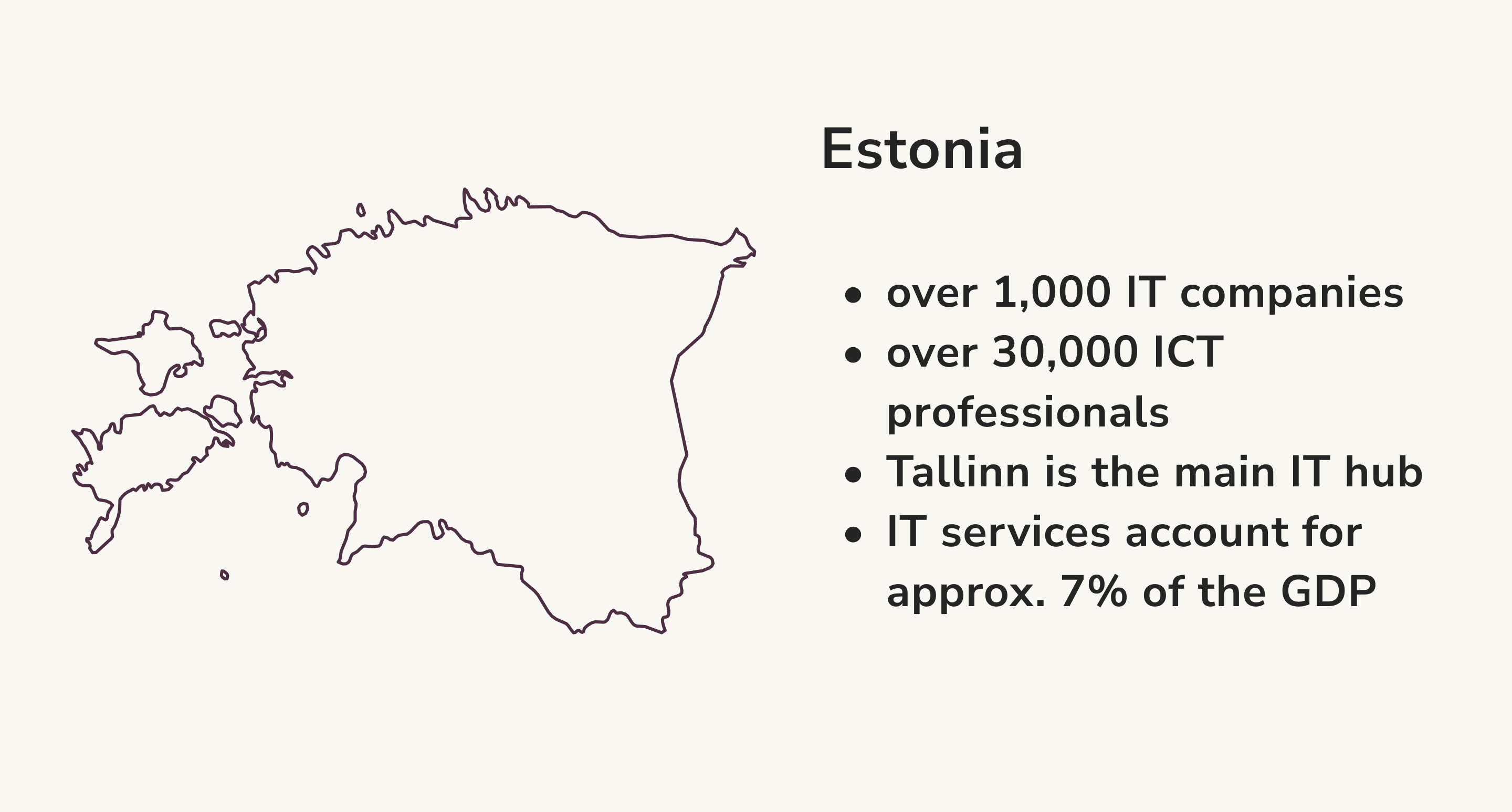
Pros
- Highly Skilled Workforce. Estonia is known for its highly educated and skilled IT professionals.
- Innovation and Technology Adoption. Estonia is a leader in digital innovation, reflected in its IT services quality.
- Geographic and Cultural Proximity. Estonia is in the same time zone as Finland and is culturally close to other Nordic countries, making collaboration easier.
Cons
- Higher Costs. Estonia's economic prosperity and high standard of living mean it is not the cheapest outsourcing destination. However, the high quality of services can often justify the cost.
- Limited Scale. Estonia is a small country with a small workforce, which may limit the scalability of outsourcing projects.
Romania
Romania's IT sector is one of the fastest-growing industries in the country. It is well-known for software development and IT services, which include outsourcing, systems integration, and custom software development. Outsourcing to Romania is a great chance to tap into a cost-effective labor force.
Overview
- There are over 20,000 IT companies in Romania.
- The number of ICT professionals in Romania is estimated to be over 150,000.
- The central IT hubs in Romania are Bucharest, Cluj-Napoca, and Timișoara, with each city having a significant concentration of IT companies and professionals.
- The IT sector contributes significantly to Romania's GDP, with IT services accounting for approximately 6% of the country's GDP.
Stability
Romania's economy is considered stable and is one of the fastest-growing within the EU. As a member of the European Union, it adheres to EU regulations and standards, providing a reliable business environment.
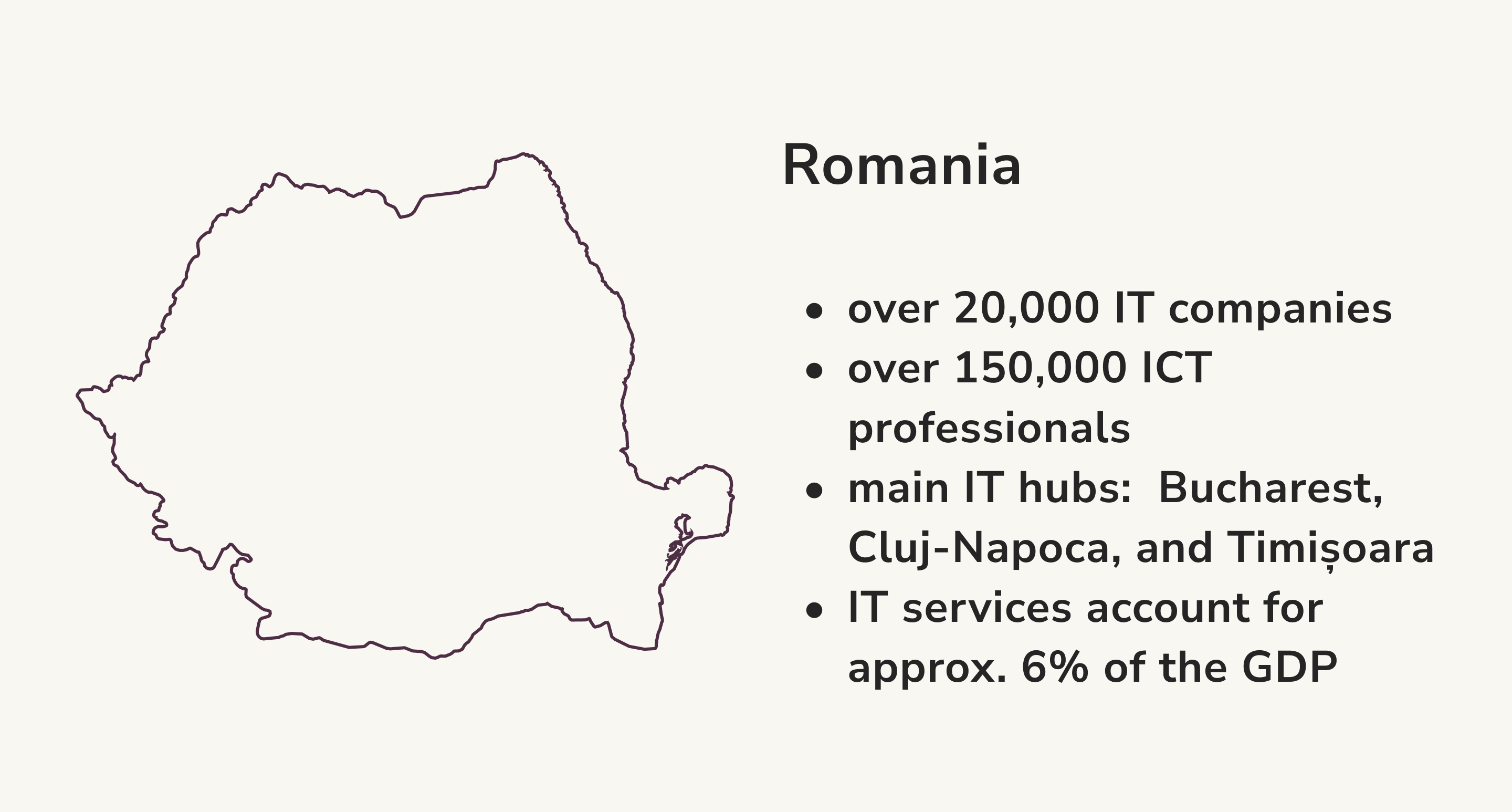
Pros
- Skilled Workforce. Thanks to a robust education system, Romania has many experienced IT professionals, particularly in STEM.
- Cost-Effective. Compared to Western Europe, Romania offers competitive rates for IT services, making it an attractive option for businesses looking to cut costs without compromising quality.
- Language Proficiency. Many Romanian professionals are proficient in English, facilitating smoother communication.
Cons
- Economic Disparities. While the IT sector in Romania is thriving, the country still faces some financial challenges, including disparities in wealth distribution and economic development across different regions.
- Competition for Talent. The demand for IT professionals in Romania can make finding and retaining the talent you need more challenging.
Bulgaria
Bulgaria's IT sector is a rapidly expanding part of its economy, focusing on software development and IT services, including outsourcing and custom software development. Outsourcing to Bulgaria offers access to some major IT hubs in the country.
Overview
- There are over 10,000 IT companies in Bulgaria.
- The number of ICT professionals in Bulgaria is estimated to be over 60,000.
- The central IT hubs in Bulgaria are Sofia, Plovdiv, and Varna, with each city boasting a considerable concentration of IT companies and professionals.
- The IT sector contributes significantly to Bulgaria's GDP, with IT services accounting for approximately 3.5% of the country's GDP.
Stability
Bulgaria's economy is considered stable and is one of the fastest-growing within the EU. As a member of the European Union, it adheres to EU regulations and standards, providing a reliable business environment.
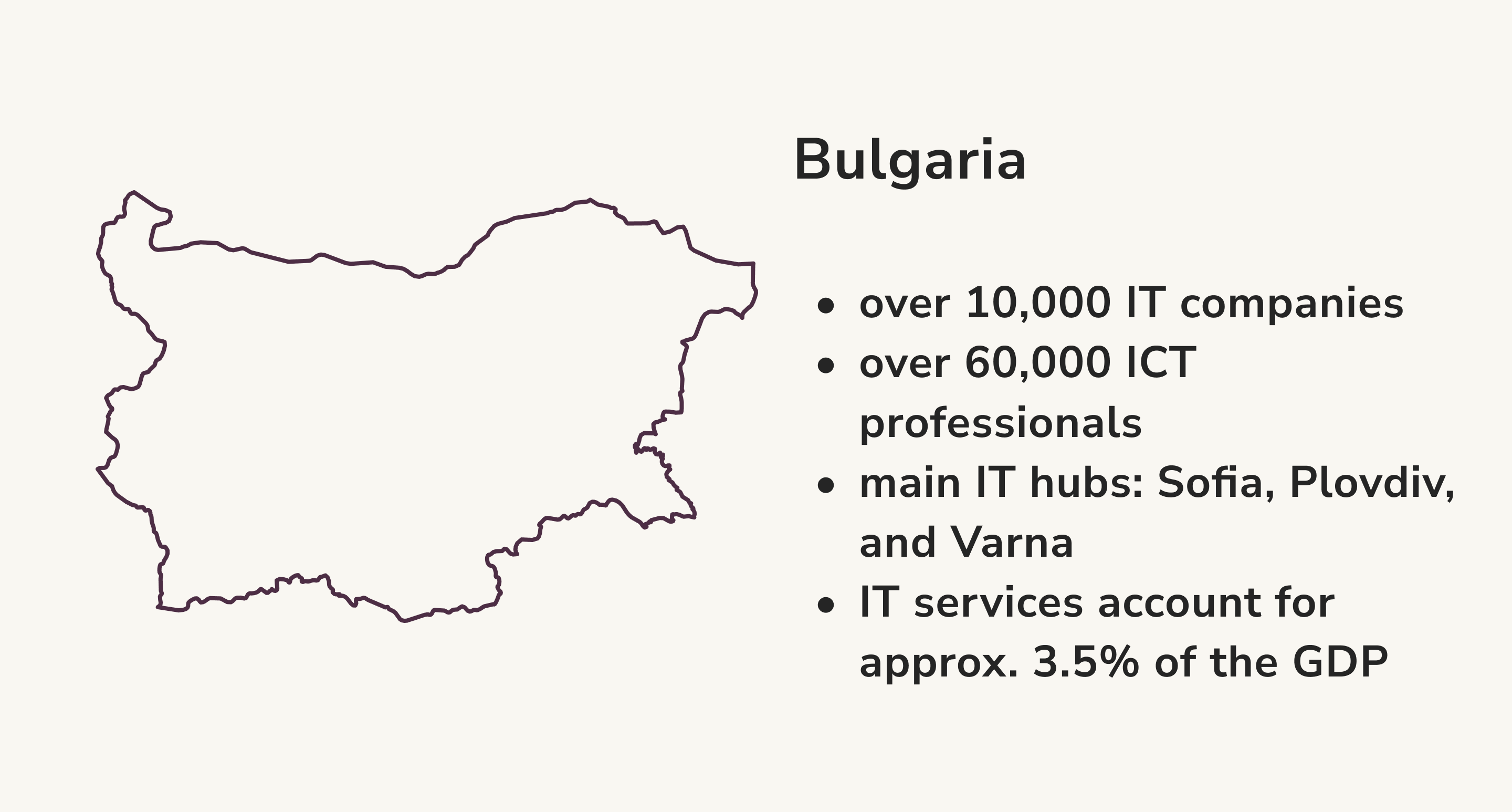
Pros
- Skilled Workforce. Thanks to a robust education system focusing on STEM, Bulgaria has many qualified IT professionals.
- Cost-Effective. Compared to Western Europe, Bulgaria offers competitive rates for IT services, making it an attractive option for businesses looking to cut costs without compromising quality.
- Language Proficiency. Many Bulgarian professionals are proficient in English, facilitating smoother communication.
Cons
- Economic Disparities. While the IT sector in Bulgaria is thriving, the country still needs some financial challenges, including disparities in wealth distribution and economic development across different regions.
- Competition for Talentю. The demand for IT professionals in Bulgaria can make finding and retaining the talent you need more challenging.
Czech Republic
The IT sector in the Czech Republic is known for its innovative technologies and high-quality IT services, including software development, IT consulting, and outsourcing. Outsourcing to the Czech Republic is an option to benefit from the geographic proximity to Western Europe and the cost-effectiveness of Eastern Europe.
Overview
- There are over 9,000 IT companies in the Czech Republic.
- The number of ICT professionals in the Czech Republic is estimated to be over 120,000.
- The leading IT hubs in the Czech Republic are Prague, Brno, and Ostrava, each of which houses many IT companies and professionals.
- The IT sector contributes significantly to the Czech Republic's GDP, with IT services accounting for approximately 3.5% of the country's GDP.
Stability
The Czech Republic has a robust and stable economy and is known for its high income, advanced economy, and high living standards. As a member of the European Union, it adheres to EU regulations and standards, providing a secure business environment.
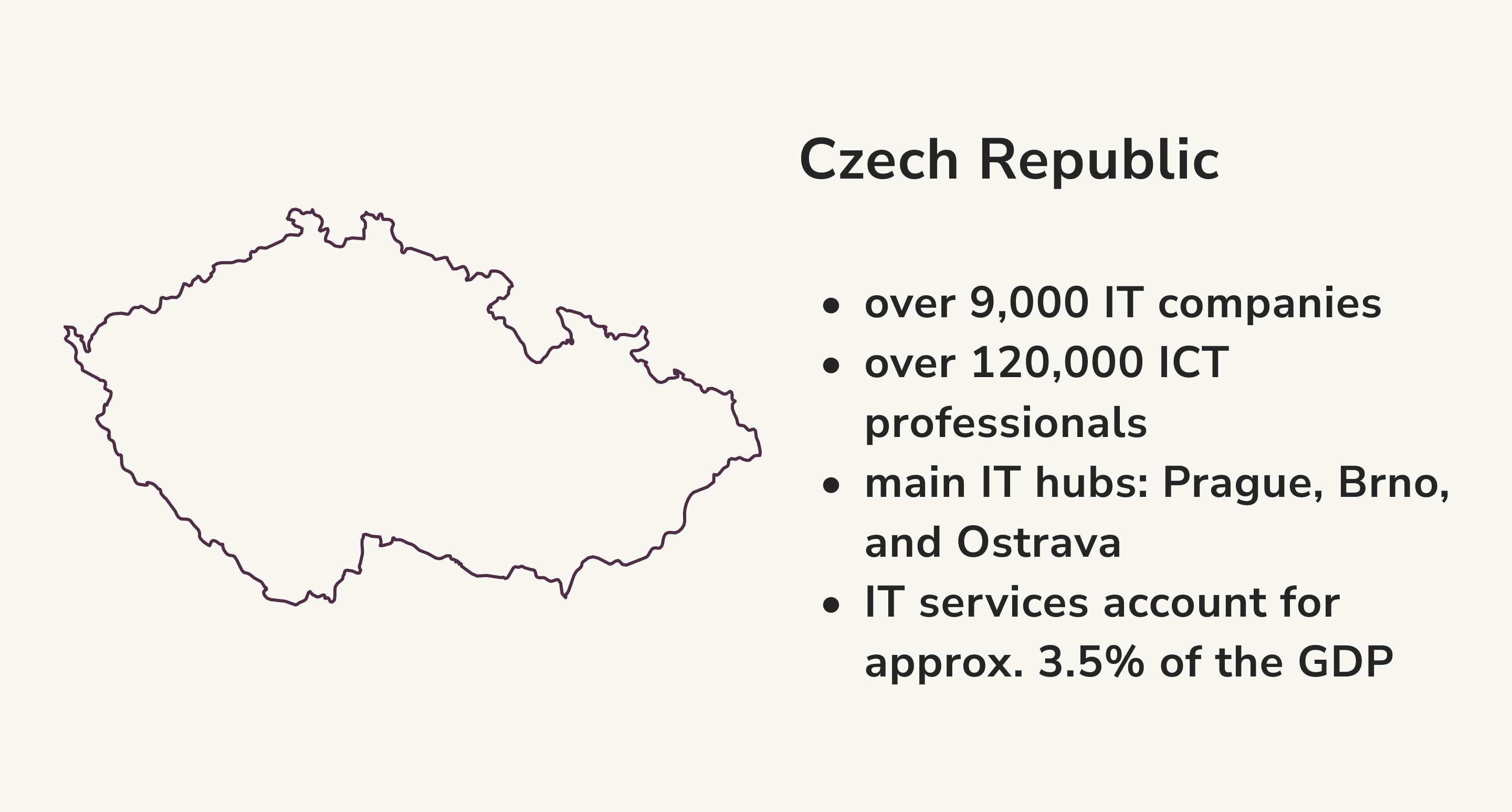
Pros
- Highly Skilled Workforce. The Czech Republic has a highly skilled workforce, especially in the IT sector. The education system is robust, with a strong emphasis on technical fields.
- Geographic and Cultural Proximity. The Czech Republic is centrally located in Europe, making it convenient for real-time collaboration with most European countries. Its workforce is highly proficient in English and other languages, facilitating smooth communication.
- High Quality of Services. The IT sector in the Czech Republic is known for its high quality of services and innovative approach to IT solutions.
Cons
- Higher Costs. Compared to other Eastern European countries, outsourcing to the Czech Republic may be higher due to its high living standards.
- Limited Scale. Although the IT sector in the Czech Republic is well-developed, it may offer a smaller pool of IT professionals than some other countries.
Conclusion
Outsourcing to Eastern Europe offers substantial benefits, such as access to a highly educated talent pool, cost-effectiveness, and a favorable business climate. As such, it is an attractive destination for businesses looking to build and structure great product teams. However, like all business decisions, it requires careful consideration and planning.
As we've explored, various countries within the region present unique opportunities and challenges. Understanding these nuances will be critical to successful outsourcing. For startup and enterprise owners alike, looking to expand their horizons, outsourcing to Eastern Europe could be the strategic move that propels your business to new heights of success.

Roman Zomko
Other articles